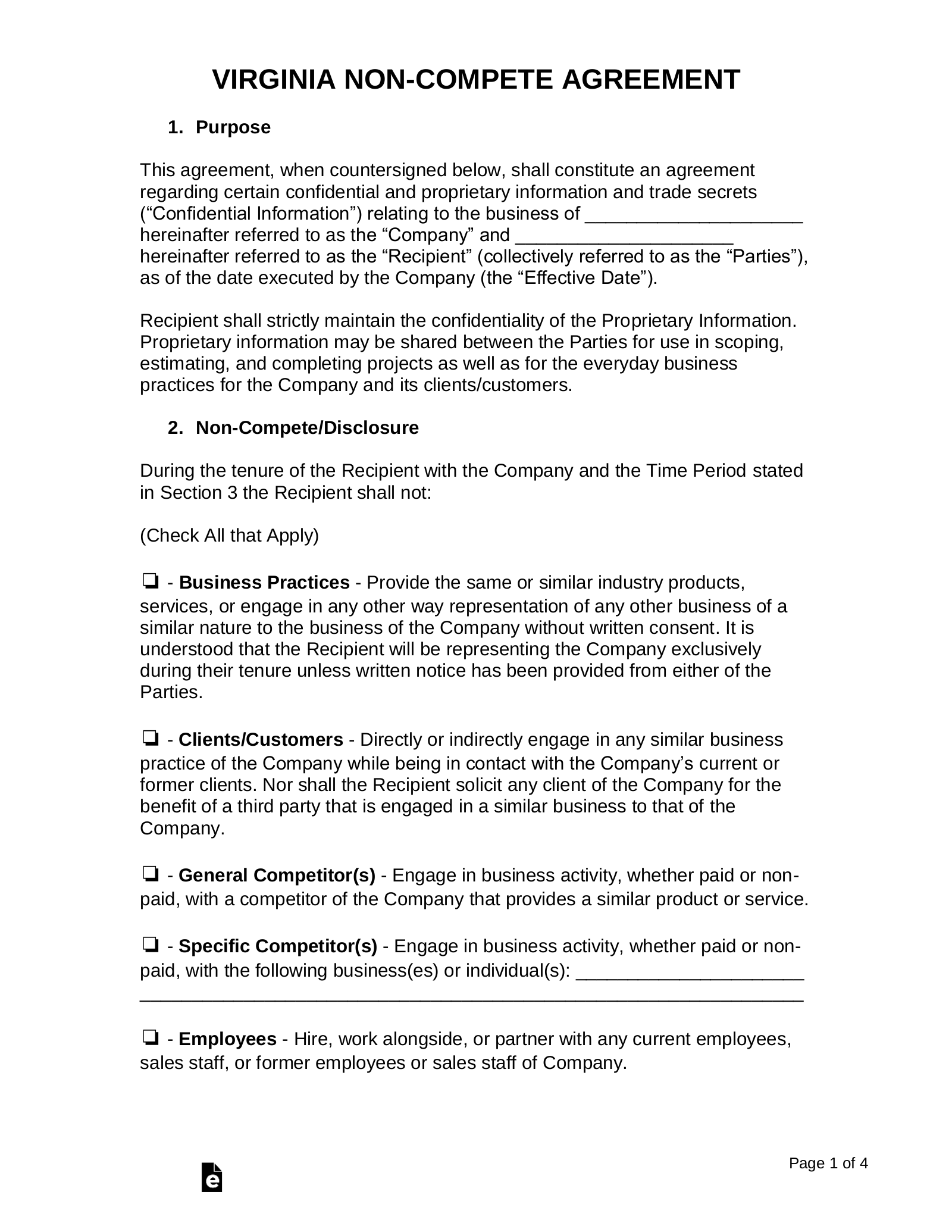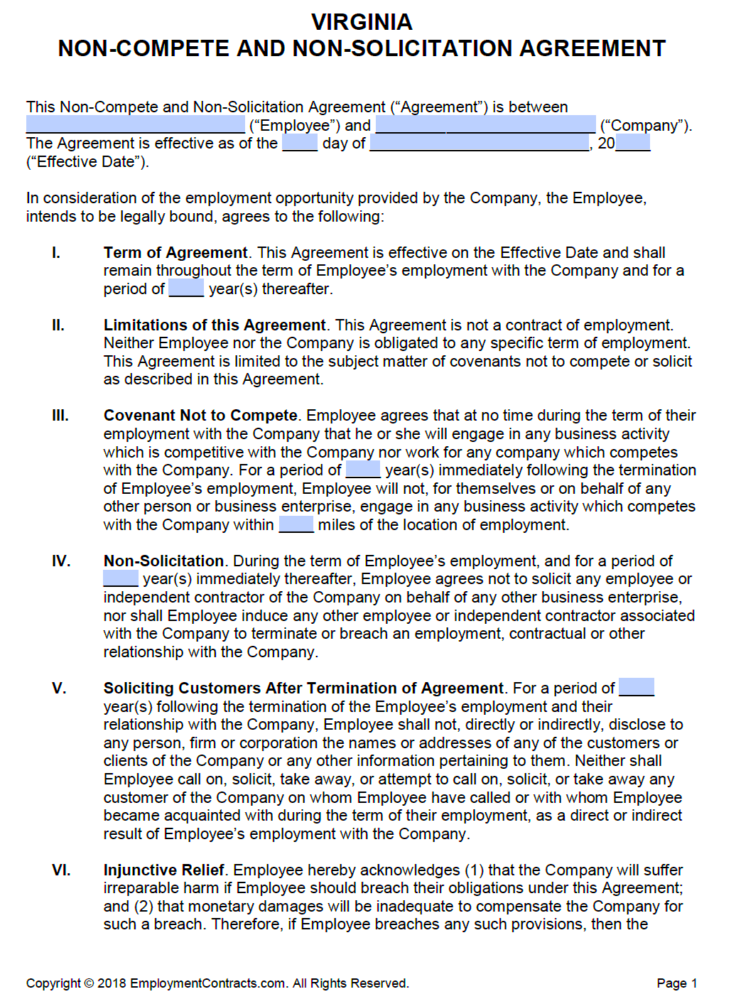Virginia Non Compete Laws and Their Impact on Employment
Whether youre an employer safeguarding your business or an employee exploring a new job opportunity grasping Virginias non compete laws is essential. Non compete agreements aim to restrict employees from joining rivals or launching similar ventures within a timeframe and location after leaving a position. In Virginia these agreements come with criteria and restrictions that can greatly influence their enforceability. Having worked in diverse roles and sectors, I have witnessed how these regulations impact employees and companies alike shaping career trajectories and business approaches in unison.
Key Elements of Non Compete Agreements

To be enforceable non compete agreements in Virginia need to meet specific criteria. Here are the aspects that should be included.
- Reasonable Scope: The agreement should clearly define the geographic area and the types of businesses or activities that are restricted. This scope must be reasonable and not overly broad.
- Duration: The time period during which the employee is restricted from competing should be reasonable. In Virginia, this typically ranges from six months to two years, depending on the nature of the business.
- Consideration: There must be a valid consideration, such as a job offer or promotion, to support the agreement. Simply signing the agreement without any additional benefit is not enough.
- Legitimate Business Interest: The employer must have a legitimate business interest that needs protection. This could include trade secrets, customer relationships, or unique business strategies.
From my point of view being clear and fair in these aspects can have an impact. For instance I used to be employed at a firm where the non compete clause was so limiting that it hindered employees from moving freely. This, in turn had an impact on overall morale and job satisfaction.
Enforceability of Non Compete Agreements in Virginia
In Virginia the enforceability of non compete agreements depends on their compliance with specific legal criteria. Courts assess these agreements considering their fairness and the safeguarding of genuine business interests. Here are factors that impact their enforceability.
- Reasonableness in Time and Space: Agreements must be reasonable in terms of the duration and geographic area covered. If the restrictions are too broad, they may be deemed unenforceable.
- Public Policy: Virginia courts also consider whether enforcing the agreement would be against public policy. For instance, if an agreement unduly restricts an individual’s ability to earn a livelihood, it may not be upheld.
- Specificity: The agreement must be specific about what activities are prohibited. Vague terms can lead to the agreement being struck down in court.
- Consideration: The agreement must be supported by adequate consideration, such as a new or continued employment position.
Based on my own experiences I’ve witnessed situations where badly written non compete clauses have resulted in protracted court disputes that can be both expensive and time consuming. Its crucial, for employers and employees to grasp these subtleties to steer clear of unnecessary conflicts.
Restrictions on Non Compete Agreements
In Virginia non-compete agreements, meant to safeguard business interests come with certain limitations to prevent them from unjustly obstructing a persons career. These safeguards are crucial for striking a balance between safeguarding business interests and granting employees the freedom to pursue their aspirations. Here are some key restrictions in place.
- Geographic Scope: The geographic area covered by the non-compete must be reasonable. For instance, a restriction that covers an entire country might be deemed excessive if the business operates only locally.
- Duration: The time period during which the non-compete is in effect should not be excessively long. Generally, agreements lasting more than two years might face scrutiny.
- Industry Specificity: Non-compete clauses must be specific about the industry or type of work restricted. A blanket prohibition on working in any capacity in any industry can be considered too broad.
- Employee’s Role: The restrictions should align with the employee’s role and the level of confidential information they had access to. Higher-level executives might face stricter terms compared to junior staff.
Looking back on my experiences I’ve noticed that contracts can cause frustration and unhappiness at work. For instance a friend of mine had a non compete clause that was so extensive it prevented him from working in his industry altogether. This not impacted his career path but also took a toll on his spirits.
Impact on Employees
Non compete clauses can greatly affect employees. By grasping these impacts individuals can navigate their career choices more wisely. Here’s a breakdown of how non compete agreements influence workers.
- Career Mobility: Employees may find it challenging to transition to new roles within the same industry if bound by a non-compete agreement. This restriction can limit career opportunities and growth.
- Job Market Access: Being restricted from working for competitors or starting a similar business can reduce job market options. This often forces individuals to take roles outside their field or geographical area.
- Negotiation Power: Non-compete clauses can affect an employee’s leverage during job negotiations. Employers may use these agreements to control the movement of key talent.
- Legal Disputes: Disputes over non-compete agreements can lead to lengthy legal battles, creating financial and emotional stress for employees.
I’ve witnessed how challenging it can be for employees to navigate the burdensome nature of non compete clauses. A coworker of mine had to take a job in a completely different field because of a non compete agreement that was too extensive. This not only hindered their career progress but also left them feeling disheartened on a personal level.
Impact on Employers
Non compete agreements serve as protective measures for employers to secure their business assets and proprietary knowledge. Nevertheless these contracts can influence their operations and interactions with employees in ways. Lets delve into the details.
- Protection of Trade Secrets: Non-compete agreements help protect sensitive business information and trade secrets by preventing former employees from joining competitors.
- Retention Challenges: While these agreements can deter employees from leaving, they can also impact employee morale and lead to higher turnover if perceived as too restrictive.
- Recruitment Difficulties: Overly stringent non-compete clauses can make it challenging for employers to recruit talent, as potential hires might be deterred by the restrictive terms.
- Legal Costs: Enforcing non-compete agreements can lead to legal expenses, especially if disputes arise. This can strain resources and divert attention from core business activities.
Based on what I’ve observed in my career I’ve come across organizations that use non compete clauses to safeguard their interests but these agreements unintentionally hinder the process of hiring and keeping employees. Striking a balance between safeguarding business with fairness is essential, for fostering a workplace culture and enticing high caliber talent.
Legal Challenges and Court Rulings
Non compete agreements frequently encounter hurdles and grasping these challenges is essential for both employers and employees. In Virginia courts carefully examine these agreements to determine their fairness and reasonableness. Below are some legal challenges and court decisions related to them.
- Overly Broad Terms: Courts frequently strike down non-compete agreements with overly broad geographic or temporal restrictions. For example, an agreement that prevents an employee from working anywhere in the U.S. for five years might be deemed unreasonable.
- Lack of Consideration: If an agreement lacks proper consideration, such as a promotion or a new job offer, it may not be enforceable. Courts require that there be something of value exchanged for the non-compete.
- Unclear Scope: Agreements with vague terms about what constitutes a competitive activity or which geographic regions are covered can lead to disputes. Clear and specific language is crucial.
- Public Policy Concerns: Courts may refuse to enforce agreements if they are found to be against public policy, such as those that severely limit an individual’s ability to earn a livelihood.
Based on my personal encounters with conflicts, I’ve realized the importance of having thoroughly prepared contracts for both parties. In one instance I remember a situation where a company attempted to uphold a non compete clause that was overly extensive and impacted the employees entire field. The court deemed this as excessive and the legal proceedings became a burdensome and lengthy process for everyone involved.
How to Draft a Compliant Non Compete Agreement
Creating a non compete agreement that holds up in court demands meticulous consideration. Here are essential pointers to ensure adherence, to the law.
- Define the Scope Clearly: Be specific about the geographic area and the types of activities that are restricted. Avoid vague language and ensure the scope is reasonable given the nature of your business.
- Set a Reasonable Duration: Limit the duration of the non-compete to a reasonable period, typically no more than one to two years. The timeframe should align with the nature of your business and the employee’s role.
- Include Adequate Consideration: Ensure that the agreement is supported by adequate consideration. This could be a new position, a promotion, or other tangible benefits that justify the restrictions imposed.
- Protect Legitimate Business Interests: Focus on protecting specific business interests such as trade secrets, client lists, or proprietary information. Avoid broad restrictions that could be viewed as overly protective.
When it comes to creating contracts I believe in keeping things straightforward and easy to understand. For instance I assisted a friend in putting together a non compete contract by carefully outlining each term and condition. This strategy not safeguarded their business interests but also made sure the contract was reasonable and could be upheld.
FAQ
What makes a non-compete agreement enforceable in Virginia?
In Virginia a non compete agreement can be upheld if it is fair in its reach, time limit and location and if there is valid consideration backing it. It should safeguard genuine business interests without being excessively limiting.
Can a non-compete agreement be challenged in court?
Certainly, non-compete clauses can be contested in legal proceedings. Typical reasons for disputing them involve excessively broad provisions, insufficient consideration and contracts that are considered contrary to societal interests.
How long should a non-compete agreement last?
A non-compete agreement should last for a period of time usually between six months and two years, based on the type of business and the employees position. If the duration is excessively long it might be considered unenforceable.
What should I do if I need to sign a non-compete agreement?
Take a close look at the terms and seek advice from a lawyer if needed. Make sure the contract is well worded fair and offers sufficient value. Its crucial to grasp how it could affect your career and future job opportunities.
Conclusion
To wrap up our talk about Virginias non compete laws its evident that these agreements play a role in balancing the interests of businesses with employee freedom. While they are crucial for safeguarding valuable assets and trade secrets they need to be crafted to avoid imposing unnecessary limitations on employees. From my own experiences I’ve witnessed how well written non compete agreements can benefit both parties by establishing guidelines and safeguarding legitimate interests. On the hand overly restrictive or poorly structured agreements can result in disputes, legal challenges and dissatisfaction. Its always wise to approach these agreements with fairness and transparency to ensure they fulfill their purpose without causing undue hardship. Thoughtfully understanding and navigating these laws can lead, to outcomes for both employers and employees.


